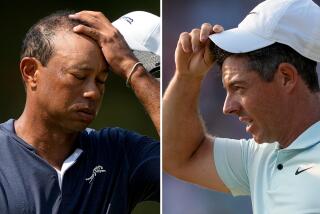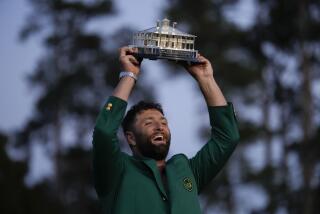No One Can Doubt His Status as All-Time Great
ST. ANDREWS, Scotland — The Royal and Ancient Golf Society brought back several of its past British Open champions for a charity tournament last Wednesday, and at first it seemed odd to see any gathering of golfing greats that didn’t include Tiger Woods.
Oh yeah. He hadn’t actually won the British Open.
Yet.
We all knew it was a matter of when, not if.
At a quarter to seven Sunday evening in the Kingdom of Fife, the inevitable became official.
The Royal and Ancient joined hands with The Future.
Woods has his British Open championship, to go with his Masters, U.S. Open and PGA championships.
“I guess the door is open now,” Woods said.
Woods just entered the first room on the right, the one occupied by the legends of the game. From here on it’s simply about jockeying for position, trying to get the seat at the head of the table.
Outside, left behind at the curb like an old sofa, is the possibility of failure. There will be no gap on Woods’ resume. There will be no “buts” in the telling of his accomplishments, the way that, say, Pete Sampras’ career summary has to include: “but he didn’t win the French Open.”
Woods walks among golf’s elite. He joined Gene Sarazen, Ben Hogan, Gary Player and Jack Nicklaus as the only players to have won all four major tournaments.
“Those are true champions right there,” said Woods, who at 24 reached the milestone at the youngest age of the five. “Every one is a true champion; they have won numerous, countless tournaments, really. They’ve been the cream of the crop. They’ve been the elite players to ever play the game. And to be, I guess, in the same breath as those guys makes it very special. Very special.”
It seems as though every move he makes conjures up the name of the game’s all-time greats.
Coming on the heels of his romp through the U.S. Open at Pebble Beach, Woods joins five other golfers who have won the U.S. Open and British Open in the same year: Hogan (1953), Sarazen (1932), Tom Watson (1982), Bobby Jones (1926, 1930) and Lee Trevino (1971).
Including last year’s PGA Championship, Woods has won three of the last four majors played. The last time someone was the reigning champion of three majors at one time was 1972, when Nicklaus won the U.S. Open, to go with his new green jacket from the Masters and his 1971 PGA Championship’s Wannamaker trophy.
In three of his major victories he has eclipsed a notable player for a noteworthy record: he won the Masters by 12 strokes (breaking Nicklaus Masters’ record of nine), he won the U.S. Open by 15 strokes (breaking Old Tom Morris’ record for majors competition of 13), and by coming in at 19-under on Sunday he reached the lowest total under par for any major (Nick Faldo set the former record of 18 at the 1990 British Open, tied by Tiger at the 1997 Masters).
There is only one standard left to meet, and that’s Nicklaus’ record of 18 major championships.
Beyond that lies the unprecedented: winning the Grand Slam in the same year.
“It is possible,” Nicklaus said. “For a young man like Tiger, he’s going to have another 10, 15 years of taking a run at it.”
Put it this way: a Grand Slam by Woods seems a lot more feasible than the thought of his contemporaries beating him on a regular basis.
Right now the only thing the rest of them can do is stand and watch or even applaud, the way Ernie Els did when Woods walked past him to the scorer’s trailer.
David Duval got his first shot to go head-to-head against Woods with a major at stake. He misfired badly; after cutting Woods’ six-stroke lead in half on the first six holes, Duval fell apart on the back nine.
Duval dropped six strokes behind with six to play, and the British Open became less about his chances to catch Woods and more about Woods’ effort to displace Faldo’s record of 18-under.
That led to the only suspenseful moment of the day, when Woods needed to make par from four feet on 18 to stay at 19-under. He did it, of course. And also finished eight shots ahead of the rest of the field.
We’ll see what damage this pounding by Woods does to Duval’s psyche. (We already know the damage it did to his paycheck: his little three-stroke visit in the Road Hole bunker that dropped him from a second-place tie to a tie for 11th cost him around $260,000 in prize money).
The competition is supposed to come from the golf courses, but Woods was the one dishing out the punishment this week.
After a week of sunshine, Woods sang the same song as the die-hard local golf fans, who wanted some nasty weather to help provide a true test. Without any nasty winds, the Old Course offered up more birdies than the San Diego Zoo.
The weather finally took on the appearance of a British Open at 5:15 p.m. Sunday, when the skies darkened and the wind picked up a little.
But it was really just for show. Woods still did whatever he wanted, giving the course a polite slap in the face. With a glove.
He played conservatively, ceding to the course layout and pin placement, content to just get around the greens and then two-putt instead of constantly firing at the flags.
Woods likes it here, not only because the wide fairways and occasional drivable greens suit his game off the tee but because he appreciates the history and tradition of golf’s home soil.
He appreciated the significance of completing the career Grand Slam on the Old Course.
Even the master of ceremonies at the Claret Jug presentation commented on Woods’ “waiting” to win his first Open until the Year 2000 St. Andrews amounted to “truly impressive stage management.”
It wasn’t just nice, or special.
It was mandatory, according to an edict once handed down to Nicklaus by Bobby Jones.
“He just said: ‘All great golfers have to win at St. Andrews,’ ” Nicklaus recalled. “ ‘The record is not complete until you do.’ ”
Consider Woods complete.
Or you can think of it in other terms.
He’s just getting started.
*
J.A. Adande can be reached at his e-mail address: [email protected]
More to Read
Go beyond the scoreboard
Get the latest on L.A.'s teams in the daily Sports Report newsletter.
You may occasionally receive promotional content from the Los Angeles Times.










